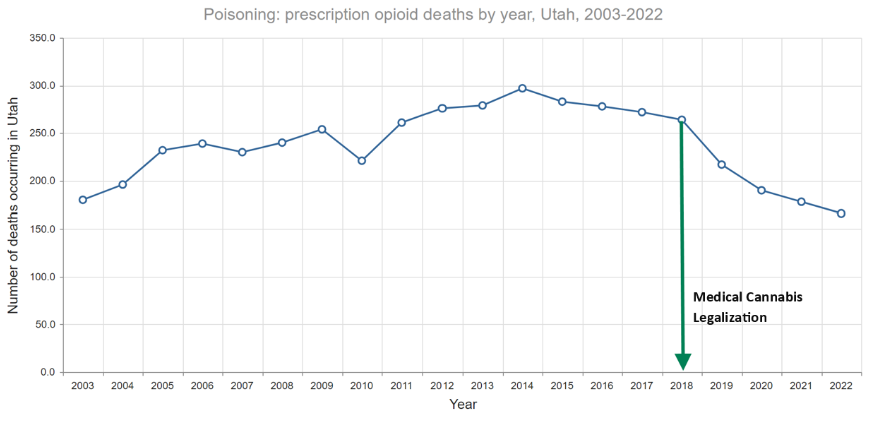
Recent research in Utah highlights cannabis as a potential game-changer in pain management. A study by Management Science Associates (MSA) found a 53% drop in opioid prescriptions among chronic pain patients who used cannabis between 2021 and 2024.
The study, presented at a Medical Cannabis Policy Advisory Board meeting, examined data from 186 patients. It revealed that 84.4% of participants reduced opioid use after starting cannabis treatment, with the greatest reduction seen in neuropathic pain (73.5%).

Insights From Utah And Minnesota Studies
Notably, vapes (67.6%), gummies (53.3%) and tinctures (19%) were the preferred products. However, chronic headache and orofacial pain patients experienced increased opioid use, underscoring the need for targeted treatments.
- Get Benzinga’s exclusive analysis and the top news about the cannabis industry and markets daily in your inbox for free. Subscribe to our newsletter here. If you’re serious about the business, you can’t afford to miss out.
MSA noted that a similar study in Minnesota reported a 30% reduction in opioid prescriptions. While acknowledging limitations such as the three-year timeframe, the MSA study says, “Cannabis may offer a safer pain management alternative, helping reduce opioid dependency and associated risks.”
What Utah's Study Means For Medical Marijuana Markets
Utah’s regulated cannabis market offers significant potential, though it faces challenges. As of October 2024, the state reported over 90,000 registered medical cannabis patients, primarily using cannabis to manage pain, according to Hemp Gazette.
Patients spent an average of $109.10 per month, close to the national average, but high product prices and strict regulations push many to out-of-state markets. Neighboring Colorado and Nevada offer products at $8.37 and $8.58 per gram, respectively, compared to Utah's $12.15.
The state's evolving regulatory framework, established after voters approved medical marijuana in 2018, has spurred growth. Recent polling by Noble Predictive Insights revealed that 50% of Utahns now support adult-use legalization, up from previous years. Younger voters, aged 18-34, lead this shift with 60% in favor of adult-use cannabis.
These developments could reshape Utah's market dynamics. Multi-state operators like Curaleaf (OTC:CURLF) and Columbia Care (OTC:CBSTF), already active in the state, stand to benefit if patient numbers grow or regulations ease. Companies focusing on effective, affordable products, such as vapes, gummies and tinctures, are well-positioned to capitalize on the increasing demand for cannabis-based pain management solutions.
Additionally, the shift towards cannabis for pain management may influence healthcare policies and insurance coverage. As more patients opt for cannabis over opioids, insurers might expand coverage for medical cannabis treatments. This potential policy change could further stimulate market growth.
Read Next:







